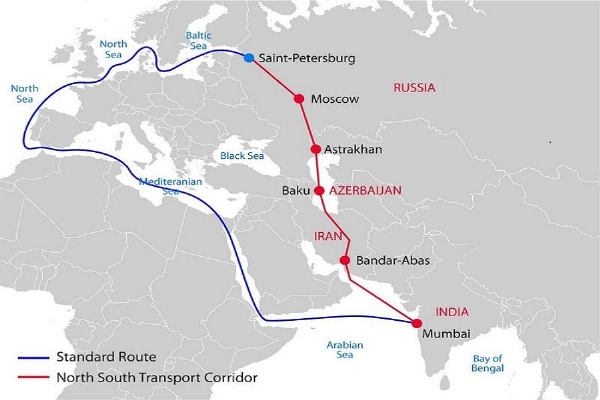The first shipment under INSTC enters Iran
Total Views |
Mumbai, Jul 15: A sea, road, and rail transport corridor linking Iran and Russia, first mooted more than two decades ago, is emerging as a key route for transporting energy, fertilizers, minerals, and foodgrain in the wake of Western sanctions imposed following the Russian invasion of Ukraine.

Though the International North-South Transport Corridor (INSTC) continues to be hampered by logistics issues and US sanctions on Iran, a Russian train with 39 containers of cargo bound for India entered Iran on Tuesday. This followed a trial run with two containers of wood laminate sheets shipped from St Petersburg to India’s Nhava Sheva port in June-July.
Russia is understood to be behind efforts to increase shipments using INSTC in view of the wide-ranging sanctions imposed on Moscow by the US and its allies. These efforts have gathered pace in recent weeks against the backdrop of growing cooperation between Russia and Iran. Russian President Vladimir Putin will make a rare foreign visit to Tehran next week to attend a trilateral meeting with the leaders of Iran and Turkey and to boost economic cooperation.
More than a dozen countries are members of INSTC and the corridor can become a significant route for transporting energy, fertilizers, minerals, and foodgrain, people aware of the development said, requesting anonymity. INSTC can also complement Russian energy shipments by sea, they said. “This is a natural alliance as India has traditionally enjoyed close ties with Iran and Russia, rooted in deep historical, cultural and civilizational links," one of them said. “The partners are also considering setting up an inter-country agency to operate the project on a commercial basis."
“INSTC is also seen as an answer to China’s One Belt One Road (OBOR) initiative. But unlike the Chinese project, this is based on the rule of law and transparency while respecting the sovereignty and territorial integrity of members," he added. When the Russian train reached the Iranian border on Tuesday, it was welcomed at a ceremony attended by first vice president Mohammad Mokhber, the vice president for science and technology and the transport, oil, industry, and agriculture ministers – reflecting the importance attached by Tehran to the development.
Also Read:
Just a day before the train arrived in Iran, state-run Islamic Republic of Iran Shipping Lines (IRISL) announced on Monday it had assigned 300 containers for the first phase of a program for transiting Russian commodities to India via INSTC.